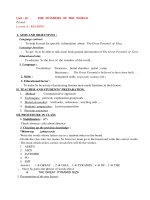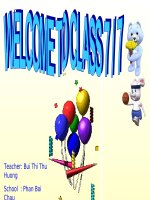marketing principles unit 2 the role of marketing
Bạn đang xem bản rút gọn của tài liệu. Xem và tải ngay bản đầy đủ của tài liệu tại đây (1.53 MB, 33 trang )
Unit
U
i 2 - The
Th Role
R l off M
Marketing
k i
in a Modern Organisation
Planning and the Marketing Process
1
CuuDuongThanCong.com
/>
Previewing the Concepts
Explain
E
l i companywide
id strategic
t t i planning
l
i and
d
its four steps.
Discuss how to design business portfolios
and growth strategies.
p
functional p
planning
g strategies
g
and
Explain
asses marketing’s role in strategic planning.
Describe the marketing process and the
f
forces
that
th t influence
i fl
it.
it
List the marketing management functions,
including the elements of a marketing plan.
plan
2
CuuDuongThanCong.com
/>
Planning
Many companies operate without formal
plans, yet these plans can provide many
benefits such as:
encouraging management to think ahead
systematically,
y
y,
forcing managers to clarify objectives and
policies, and
p
helping the company to anticipate and respond
quickly to environmental changes and sudden
developments.
3
CuuDuongThanCong.com
/>
Strategic Planning
Strategic
g Planning
g is the Process of
Developing and Maintaining a
g Fit Between the
Strategic
Organizations' Goals and
p
and Its Changing
g g
Capabilities
Marketing Opportunities.
4
CuuDuongThanCong.com
/>
Steps in Strategic Planning
5
CuuDuongThanCong.com
/>
3M
A mission statement
is a statement of an
organisation’s
i ti ’
purpose.
“ 3M solves
“…
sol es
people’s problems by
putting innovation to
work for them.”
/>6
CuuDuongThanCong.com
/>
Setting Company Objectives
and Goals
Mission
Statement
Marketing
M
k i
Objective # 1
Marketing
Strategy
Marketing
Strategy
Marketing
M
k i
Objective # 2
Marketing
Strategy
Marketing
M
k i
Objective # 3
Marketing
Strategy
Marketing
Strategy
7
CuuDuongThanCong.com
/>
Designing the Business Portfolio
The business portfolio is the collection of
businesses and products that make up the
company.
The company must:
analyse its current business portfolio or Strategic
Business Units (SBU’s),
decide which SBU
SBU’s
s should receive more
more, less
less, or no
investment,
pg
growth strategies
g
for adding
g new p
products or
develop
businesses to the portfolio.
8
CuuDuongThanCong.com
/>
QuickTime™ and a
TIFF (Uncompressed) decompressor
are needed to see this picture.
9
CuuDuongThanCong.com
/>
The Marketing Process
10
CuuDuongThanCong.com
/>
The Five Cs
Company
p y
Internal Resources, Capabilities
Customers
Needs, wants and characteristics of current &
potential Customers
Competitors
Strengths and Weaknesses of competitors
Collaborations
Co abo at o s
Opportunities and Threats
Context
Environment
11
CuuDuongThanCong.com
/>
Macroenvironment
PESTLE
Political Issues
Economic Forces
Socio-cultural Changes
Technological Changes
Legal and Regulatory
Changes
Environmental Forces
PEST
Political/Legal Factors
Economic Factors
Socio-cultural Factors
Technological Changes
12
CuuDuongThanCong.com
/>
Analyzing Current SBU’s:
BCG Growth-Share
G
h Sh
M
Matrix
i
Relative Market Share
Low
Markket Grow
wth Ratte
Hig
gh
High
Stars
• High growth & share
• Profit potential
• May need heavy
investment to grow
Cash Cows
• Low
L
growth,
th high
hi h share
h
• Established, successful
SBU’s
• Produce cash
Low
Question Marks
?
• High growth, low share
• Build into Stars or phase out
• Require cash to hold
market share
Dogs
• Low growth & share
• Low profit potential
13
CuuDuongThanCong.com
/>
QuickTime™ and a
TIFF (Uncompressed) decompressor
are
a
e needed
eeded to
o see this
sp
picture.
cue
14
CuuDuongThanCong.com
/>
The GE Matrix
Business Strength
Strong
Average Weak
Industry High
Attractiveness Medium
Low
15
CuuDuongThanCong.com
/>
Problems With Matrix Approaches
Can be Difficult, Time-Consuming, Costly to Implement
Difficult to Define SBU’s & Measure Market Share/Growth
Focus on Current Businesses
Businesses, But Not Future Planning
Can Lead to Unwise Expansion or Diversification
16
CuuDuongThanCong.com
/>
Planning
g Cross-Functional
Strategies
Marketing’s Role in Strategic Planning
Guiding
Philosophy
Inputs to
g
Strategic
Planners
Design
Strategies
17
CuuDuongThanCong.com
/>
Value Delivery Network
Company’s
Value
Chain
Customers
Suppliers
Distributors
18
CuuDuongThanCong.com
/>
Porter’s
Porter
s 5 Forces Model
19
CuuDuongThanCong.com
/>
SWOT Analysis
Draws Together strategic conclusions and their
implications based on the facts
Positive
Implications
Negative
g
Implications
Internal
Strengths
Weaknesses
External
Opportunities Threats
20
CuuDuongThanCong.com
/>
Connecting With Customers
Market Segmentation: determining distinct groups
of buyers (segments) with different needs,
characteristics, or behavior.
Market Targeting: evaluating each segment’s
attractiveness and selecting
g one or more segments
g
to enter.
g arranging
g g for a p
product to
Market Positioning:
occupy a clear, distinctive, and desirable place
relative to competing products in the minds of
t
target
t consumers. i.e.
i Chevy
Ch
Bl
Blazer iis “lik
“like a rock.”
k”
21
CuuDuongThanCong.com
/>
Whatt iis th
Wh
the diff
difference between
b t
a
market segment and a market target?
22
CuuDuongThanCong.com
/>
Developing the Marketing Mix
23
CuuDuongThanCong.com
/>
The 4 P’s
P s & 4 C’s
C s of the
Marketing Mix
4 P’s
4 C’s
Product
Price
Place
Promotion
Customer Solution
Customer Cost
Convenience
Communication
24
CuuDuongThanCong.com
/>
Sometimes there are some
extra Ps
People
Physical Evidence
Process
25
CuuDuongThanCong.com
/>









